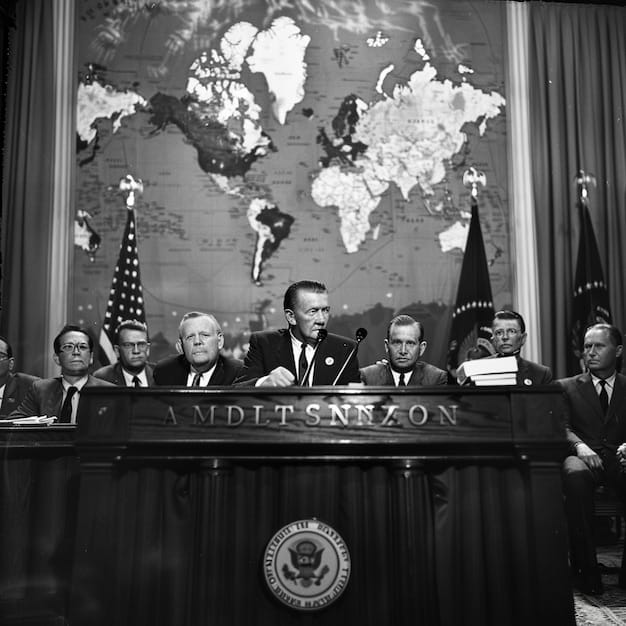US Diplomatic Efforts: Resolving International Disputes?

US Diplomatic Efforts: Can They Resolve the Ongoing International Disputes? involve a range of strategies, including negotiation, mediation, and sanctions, aimed at de-escalating conflicts and fostering international cooperation, though their effectiveness varies depending on the specific context and the willingness of all parties to engage constructively.
The world stage is riddled with ongoing disputes, from regional conflicts to global power struggles. Can US Diplomatic Efforts: Can They Resolve the Ongoing International Disputes?, often seen as a key player in international relations, truly bring about lasting peace and stability?
Understanding Us Diplomatic Efforts
US diplomacy encompasses a broad spectrum of strategies and tactics aimed at influencing the behavior of other states and non-state actors. Diplomatic efforts are rooted in the belief that dialogue and negotiation can resolve conflicts peacefully and promote American interests abroad.
The Core Principles of Us Diplomacy
At its core, US diplomacy is guided by several key principles. These include the promotion of democracy, human rights, and the rule of law. These principles inform the US approach to international relations and are often cited as justification for diplomatic interventions.
Furthermore, US diplomacy emphasizes the importance of multilateralism, working with allies and international organizations to address global challenges. This approach is seen as crucial to maintaining international stability and promoting shared interests.

Tools and Strategies in the Diplomatic Arsenal
US diplomats employ a variety of tools and strategies, including negotiation, mediation, sanctions, and foreign aid. Negotiation involves direct talks between representatives of conflicting parties, while mediation entails a neutral third party facilitating dialogue and compromise.
- Bilateral Agreements: Formal agreements between the US and another country on specific issues.
- Multilateral Treaties: Agreements involving multiple countries, often addressing shared concerns like climate change or arms control.
- Public Diplomacy: Efforts to engage foreign publics and promote understanding of US policies and values.
- Track II Diplomacy: Informal dialogues and exchanges involving non-governmental actors to build trust and explore potential solutions.
In conclusion, understanding US diplomatic efforts requires a recognition of the principles that guide them and the tools that are available to diplomats. These efforts play a crucial role in shaping the international landscape and promoting American interests.
Historical Successes of Us Diplomacy
Throughout history, US diplomacy has achieved notable successes in resolving international disputes. These achievements highlight the potential of diplomatic engagement and provide valuable lessons for future endeavors.
The Camp David Accords: A Landmark Achievement
One of the most celebrated examples of US diplomatic success is the Camp David Accords of 1978. In this remarkable feat of diplomacy, President Jimmy Carter brokered a peace agreement between Egypt and Israel, two nations that had been in conflict for decades.
The Camp David Accords not only ended the state of war between Egypt and Israel but also laid the foundation for a more stable and peaceful Middle East. The agreement remains a testament to the power of sustained diplomatic engagement and the willingness of leaders to compromise.
The Iran Nuclear Deal: A Controversial but Significant Agreement
Another significant example of US diplomacy is the Iran Nuclear Deal, reached in 2015. Officially known as the Joint Comprehensive Plan of Action (JCPOA), the agreement was designed to prevent Iran from developing nuclear weapons in exchange for the lifting of economic sanctions.
While the Iran Nuclear Deal has been highly controversial, it represents a significant diplomatic effort to address a complex and potentially destabilizing issue. The agreement demonstrated the ability of the US to work with international partners to achieve a common goal.
In summary, these historical successes illustrate the potential of US diplomacy to resolve international disputes and promote peace and stability. Although challenges remain, these achievements provide hope for future diplomatic endeavors.
Challenges Facing Us Diplomatic Efforts Today
Despite its historical successes, US diplomacy faces significant challenges in today’s complex and rapidly changing world. These challenges include rising geopolitical tensions, the proliferation of non-state actors, and the erosion of international norms.
Rising Geopolitical Tensions
One of the most pressing challenges facing US diplomacy is the rise of geopolitical tensions between major powers. The resurgence of Russia and the growing assertiveness of China have created new flashpoints and complicated efforts to resolve international disputes.
These tensions have been further exacerbated by conflicts in regions such as Eastern Europe, the South China Sea, and the Middle East. Navigating these complex geopolitical dynamics requires skillful diplomacy and a willingness to engage with adversaries.

The Proliferation of Non-State Actors
Another challenge facing US diplomacy is the proliferation of non-state actors, including terrorist groups, criminal organizations, and cyber hackers. These actors often operate outside the bounds of international law and pose a threat to global security.
Dealing with non-state actors requires a different approach than traditional diplomacy, which is typically focused on state-to-state relations. It requires a combination of diplomatic, military, and intelligence efforts to disrupt their operations and address the root causes of their emergence.
The Erosion of International Norms
Finally, US diplomacy is challenged by the erosion of international norms and institutions. In recent years, there has been a growing tendency for states to disregard international law and norms, undermining the foundation of the international order.
- Disregard for International Law: Violations of international treaties and norms by various states.
- Weakening of International Institutions: Reduced support for and effectiveness of international organizations like the UN.
- Rise of Nationalism: Increased focus on national interests over global cooperation.
In conclusion, addressing these challenges requires a renewed commitment to diplomacy and a willingness to adapt to the changing international landscape. The US must work with allies and partners to uphold international norms and promote peaceful resolutions to disputes.
Strategies for Enhancing Us Diplomatic Effectiveness
To enhance the effectiveness of US diplomatic efforts, several strategies can be employed. These include strengthening diplomatic capacity, promoting multilateralism, and prioritizing conflict prevention.
Strengthening Diplomatic Capacity
One key strategy for enhancing US diplomatic effectiveness is to strengthen diplomatic capacity. This involves investing in training, resources, and personnel to ensure that US diplomats are well-equipped to address the challenges they face.
Promoting Multilateralism
Another important strategy is to promote multilateralism by working with allies and international organizations to address global challenges. This approach can amplify the impact of US diplomacy and promote shared interests.
Prioritizing Conflict Prevention
Finally, US diplomacy should prioritize conflict prevention by addressing the root causes of conflict and promoting peaceful resolutions to disputes before they escalate into violence.
- Early Warning Systems: Developing systems to identify and respond to potential conflicts.
- Mediation and Dialogue: Supporting efforts to facilitate dialogue between conflicting parties.
- Economic Development: Promoting economic development and reducing poverty to address underlying grievances.
In summary, these strategies can help to enhance the effectiveness of US diplomatic efforts and promote peace and stability in the world.
The Role of Public Opinion and Domestic Politics
Public opinion and domestic politics play a significant role in shaping US diplomatic efforts. Policymakers must consider the views of the public, interest groups, and political parties when formulating and implementing foreign policy.
The Influence of Public Opinion
Public opinion can influence US diplomacy in several ways. Policymakers are often hesitant to pursue policies that are unpopular with the public, particularly when it comes to the use of military force or economic sanctions.
The Impact of Domestic Politics
Domestic politics can also shape US diplomatic efforts. Political parties often have different views on foreign policy issues, and these differences can lead to gridlock and inconsistency in US diplomacy.
In conclusion, public opinion and domestic politics are important factors to consider when evaluating the effectiveness of US diplomatic efforts. Policymakers must balance the need to promote American interests abroad with the need to maintain public support at home.
Future Directions for Us Diplomacy
Looking ahead, US diplomacy must adapt to the evolving international landscape and address new challenges. This requires embracing innovation, fostering partnerships, and prioritizing long-term strategic goals.
Embracing innovation
One key direction for US diplomacy is to embrace innovation by leveraging new technologies and approaches to engage with foreign audiences and address global challenges, such as in resolving US Diplomatic Efforts: Can They Resolve the Ongoing International Disputes?
Fostering Partnerships
Another important direction is to foster partnerships by working with allies, international organizations, and civil society groups to achieve common goals.
Prioritizing Long-Term Strategic Goals
Finally, US diplomacy must prioritize long-term strategic goals by focusing on addressing the root causes of conflict and promoting sustainable development and the globe overall.
In summary, these future directions can help to ensure that US diplomacy remains effective and relevant in the years to come.
| Key Point | Brief Description |
|---|---|
| 🤝 Negotiation | Direct talks to resolve conflicts peacefully. |
| 🌍 Multilateralism | Working with allies for shared global goals. |
| 🕊️ Conflict Prevention | Addressing root causes to avoid escalation. |
| 🛡️ Strengthening Diplomacy | Investing in training and resources for diplomats. |
FAQ
US diplomatic efforts primarily aim to promote American interests abroad, maintain international stability, and foster cooperation to address global challenges like climate change, terrorism, and economic crises.
US diplomacy has evolved from isolationism to active global engagement, adapting to new challenges and power dynamics, and increasingly using tools like multilateralism and public diplomacy to achieve its objectives.
Sanctions are a key tool in US diplomacy, used to pressure countries or entities to change their behavior by restricting their access to the global financial system or limiting their trade opportunities.
Public opinion can significantly influence US diplomatic efforts, as policymakers often consider public support when formulating and implementing foreign policy, particularly in decisions involving military interventions or international agreements.
Emerging challenges for US diplomacy include rising geopolitical tensions, the increasing role of non-state actors, cyber threats, and the erosion of international norms and institutions, making diplomatic solutions more complex.
Conclusion
In conclusion, US diplomatic efforts are vital for addressing ongoing international disputes, requiring adaptability, innovation, and a commitment to multilateralism. While challenges persist, strategic enhancements and a focus on long-term goals can bolster US diplomacy’s effectiveness in promoting global peace and stability.





